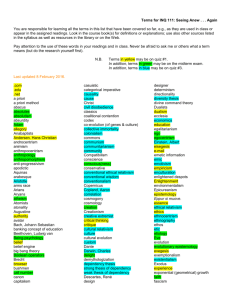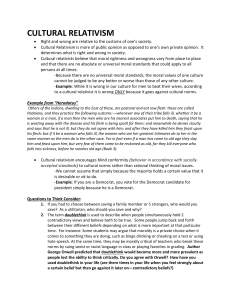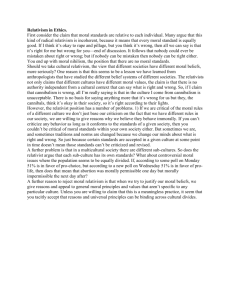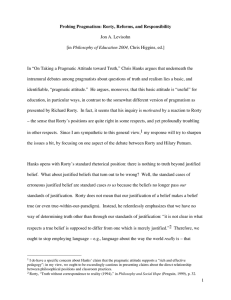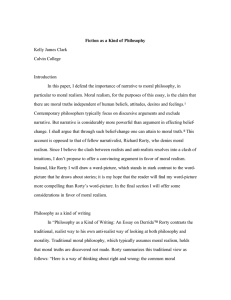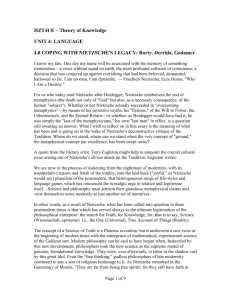Philosophical Foundations of Human Rights
advertisement
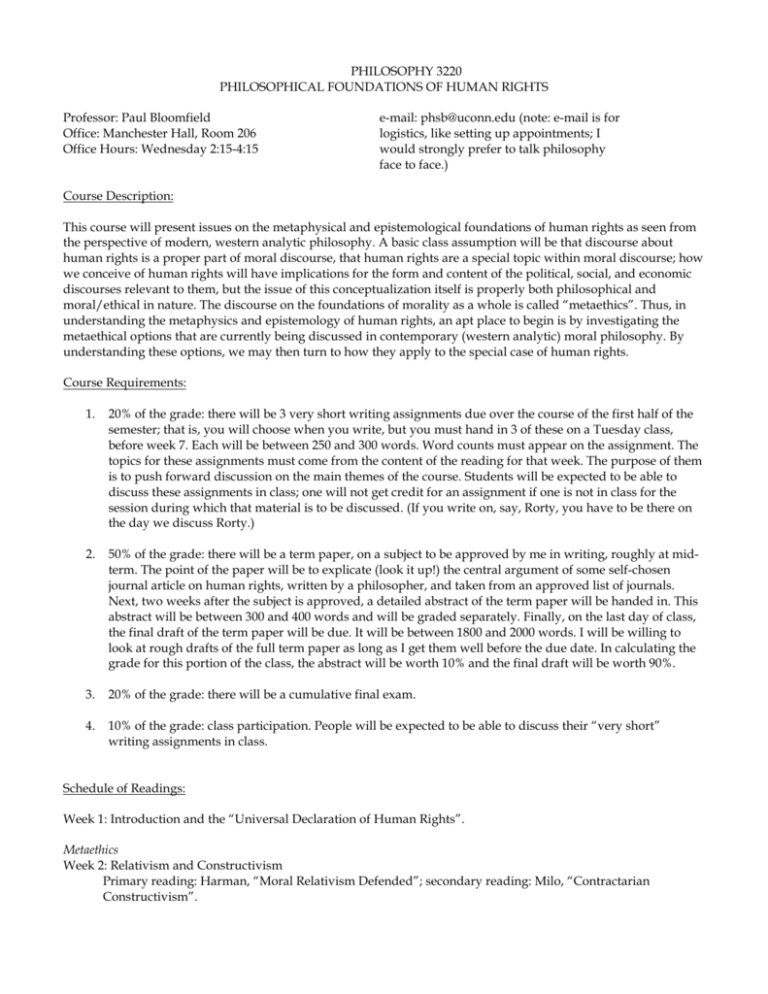
PHILOSOPHY 3220 PHILOSOPHICAL FOUNDATIONS OF HUMAN RIGHTS Professor: Paul Bloomfield Office: Manchester Hall, Room 206 Office Hours: Wednesday 2:15-4:15 e-mail: phsb@uconn.edu (note: e-mail is for logistics, like setting up appointments; I would strongly prefer to talk philosophy face to face.) Course Description: This course will present issues on the metaphysical and epistemological foundations of human rights as seen from the perspective of modern, western analytic philosophy. A basic class assumption will be that discourse about human rights is a proper part of moral discourse, that human rights are a special topic within moral discourse; how we conceive of human rights will have implications for the form and content of the political, social, and economic discourses relevant to them, but the issue of this conceptualization itself is properly both philosophical and moral/ethical in nature. The discourse on the foundations of morality as a whole is called “metaethics”. Thus, in understanding the metaphysics and epistemology of human rights, an apt place to begin is by investigating the metaethical options that are currently being discussed in contemporary (western analytic) moral philosophy. By understanding these options, we may then turn to how they apply to the special case of human rights. Course Requirements: 1. 20% of the grade: there will be 3 very short writing assignments due over the course of the first half of the semester; that is, you will choose when you write, but you must hand in 3 of these on a Tuesday class, before week 7. Each will be between 250 and 300 words. Word counts must appear on the assignment. The topics for these assignments must come from the content of the reading for that week. The purpose of them is to push forward discussion on the main themes of the course. Students will be expected to be able to discuss these assignments in class; one will not get credit for an assignment if one is not in class for the session during which that material is to be discussed. (If you write on, say, Rorty, you have to be there on the day we discuss Rorty.) 2. 50% of the grade: there will be a term paper, on a subject to be approved by me in writing, roughly at midterm. The point of the paper will be to explicate (look it up!) the central argument of some self-chosen journal article on human rights, written by a philosopher, and taken from an approved list of journals. Next, two weeks after the subject is approved, a detailed abstract of the term paper will be handed in. This abstract will be between 300 and 400 words and will be graded separately. Finally, on the last day of class, the final draft of the term paper will be due. It will be between 1800 and 2000 words. I will be willing to look at rough drafts of the full term paper as long as I get them well before the due date. In calculating the grade for this portion of the class, the abstract will be worth 10% and the final draft will be worth 90%. 3. 20% of the grade: there will be a cumulative final exam. 4. 10% of the grade: class participation. People will be expected to be able to discuss their “very short” writing assignments in class. Schedule of Readings: Week 1: Introduction and the “Universal Declaration of Human Rights”. Metaethics Week 2: Relativism and Constructivism Primary reading: Harman, “Moral Relativism Defended”; secondary reading: Milo, “Contractarian Constructivism”. Week 3: Pragmatism and Ethnocentricism Readings: Rorty, Selections from Objectivity, Relativism, and Truth. FOR NEXT TIME, TAKE OUT POSTMODERN BOURGOISE LIBERALISM Week 4: Non-Naturalist Realism and Rationalism Primary reading: Hampton, selections from The Authority of Reason; secondary reading, Shafer-Landau, “Moral and Theological Realism” Week 5: Naturalist Realism and the Human Condition Primary reading: Boyd, “How To Be a Moral Realist”; secondary reading, Foot, “Transition to Human Beings” from Natural Goodness. Human Rights Week 6: Constructivism and Relativism Readings: Pogge, “How Should Human Rights be Conceived?” and Donnelly, “Human Rights and Human Dignity”. Week 7: Pragmatism Primary reading: Rorty, “Human Rights, Rationality, and Sentimentality”. Week 8: Rationalism Primary reading: Gewirth, selections from The Community of Rights; secondary reading, Nagel, “The Value of Inviolability”. Week 9: Naturalism Primary reading: Nussbaum, “Capabilities and Human Rights”; secondary reading: Pogge, “Human Flourishing and Universal Justice”. Positive and Negative Rights Week 10: Beneficence and Malfeasance/Perfect and Imperfect Duties Primary readings: O’Neill, “Duty and Obligation”, Gewirth, selections from The Community of Rights; secondary reading, Cranston, “Human Rights, Real and Supposed”. Weeks 11 and 12: Civic Rights and Social-Economic Rights Reading: Shue, selections from Basic Rights. Week 13: Spill-over and Wrap-up. ___________________________________________________________________________________________ FROM: UConn's Responsibilities of Community Life: The Student Code “Academic Integrity: A fundamental tenet of all educational institutions is academic honesty; academic work depends upon respect for and acknowledgement of the research and ideas of others. Misrepresenting someone else's work as one’s own is a serious offense in any academic setting and it will not be condoned. Academic misconduct includes, but is not limited to, providing or receiving assistance in a manner not authorized by the instructor in the creation of work to be submitted for academic evaluation (e.g. papers, projects, and examinations); any attempt to influence improperly (e.g. bribery, threats) any member of the faculty, staff, or administration of the University in any matter pertaining to academics or research; presenting, as one's own, the ideas or words of another for academic evaluation; doing unauthorized academic work for which another person will receive credit or be evaluated; and presenting the same or substantially the same papers or projects in two or more courses without the explicit permission of the instructors involved. A student who knowingly assists another student in committing an act of academic misconduct shall be equally accountable for the violation, and shall be subject to the sanctions and other remedies described in The Student Code.” ____________________________________________________________________________________________ NOTE: Plagiarism, which implies academic misconduct, need not involve using the exact words of another person, note that the following counts as an example of plagiarism: Original (by Thomas Hill, Jr.) "Imperatives are hypothetical if *either* they support particular prescriptions for a person only in conjunction with premises describing that person's ends *or* they cannot themselves be supported without premises describing the ends of the person to whom they are directed." Plagiarism "An imperative is hypothetical if it defends a certain instruction for an agent exclusively in conjunction with the premises which express that agent's ends, or if it cannot be established without the premises which illustrate the ends of the agent for whom they are designed."

